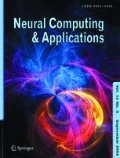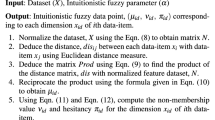Abstract
Self-organising maps (SOM) have become a commonly-used cluster analysis technique in data mining. However, SOM are not able to process incomplete data. To build more capability of data mining for SOM, this study proposes an SOM-based fuzzy map model for data mining with incomplete data sets. Using this model, incomplete data are translated into fuzzy data, and are used to generate fuzzy observations. These fuzzy observations, along with observations without missing values, are then used to train the SOM to generate fuzzy maps. Compared with the standard SOM approach, fuzzy maps generated by the proposed method can provide more information for knowledge discovery.
Similar content being viewed by others
Acknowledgments.
The author is indebted to anonymous referees for their valuable comments for the revision of this article.
Author information
Authors and Affiliations
Corresponding author
Rights and permissions
About this article
Cite this article
Wang, S. Application of self-organising maps for data mining with incomplete data sets. Neural Comput&Applic 12, 42–48 (2003). https://doi.org/10.1007/s00521-003-0372-1
Received:
Accepted:
Issue Date:
DOI: https://doi.org/10.1007/s00521-003-0372-1




